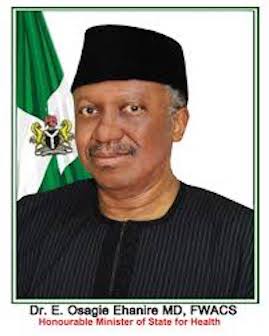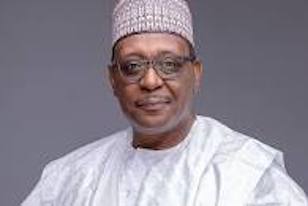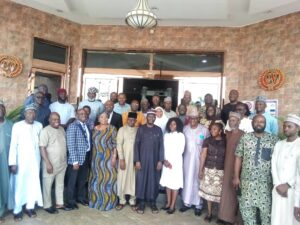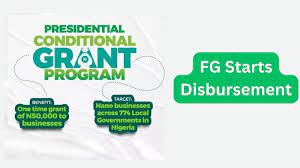Health
Tuberculosis: 57,000 Children are Infected Annually

By Laide Akinboade, Abuja
Experts have revealed that over 57,000 children in Nigeria are infected with Tuberculosis annually.
Dr. Odume Bethrand, the Executive Director of KNCV, stated this while briefing newsmen on the 2020 Pre- World TB, day organized by National Tuberculosis and Leprosy Control Programme, NTBLCP, and Stop TB partnership Nigeria, in Abuja,
He said the emergence of drug resistant TB posed a major health threat and could put at risk the gains made in efforts to end TB.
He decried the fact that out of $278 million needed in control of TB in Nigeria in 2019, only $52.8 million, 40%, was made available which affected the control of TB in 2019.
The theme for this year’s celebration is ‘Check that cough, Time no dey’, the theme will ensure the world is reminded of the commitments made and timely need for action to scale up, research, funding, human rights and accountability.
He noted that, “Nigeria is among the 30 high burden countries for TB, TB/HIV and MDR-TB, ranked 6th among the 30 high TB burden countries and 1st in Africa. Nigeria accounts for 12 % of the global TB incidence and notified cases, out of 429,000 estimated new TB cases in Nigeria in 2019 only 120, 266 were notified to the NTBLCP with 28% treatment coverage.
“An estimated 21,000 DR-TB cases recorded in 2018, only 2,384, 11%, were diagnosed and 83% of them enrolled on second day line treatment. Only 8% of all forms of notified TB cases are children less than 15 years.
DOES CLINIC is only available in 30% of health facilities in Nigeria, and only 8% of them have TB diagnostic services. Of the $278 million needed for TB control in Nigeria in year 2019, only 40% was available to all the implementers of TB control activities in Nigeria, 8% domestic and 32% donor full dstv, with 60% funding gap”.
TB is an infectious disease caused by bacteria known as mycobacteria tuberculosis. It is passed from person to person through air.
Anyone can have TB disease , but people experience who have weakened immune system are at higher risk of getting sick like elderly people, children, persons with diabetes Mellitus, HIV, cancer etc. TB most commonly affects the lungs but affect any other parts of the body.
Symptoms include, continuous cough lasting for two weeks or more, fever lasting for 2 weeks or more, sweating at night even when the weather is cold, weight loss, difficulty in breathing, chest pain and blood stain sputum.
Diagnosis and treatment is free in all government owned health facilities.
Among experts who were present at the briefing, Ayodele Awero, from World Health Organization, WHO, Dr. Temitayo Odusote, United States Agency for International Development, USAID, Odume Bethrand, CEO of KNCV, Ronke Agbaje, Institute of Human Virology Nigeria, etc.
Health
Psychiatrists Demand Decriminalization of Attempted Suicide

By Ubong Ukpong, Abuja
Association of Psychiatrists in Nigeria (APN) President, Prof. Taiwo James Obindo, has asked for the decriminalization of attempted suicide in the country.
He made the call at a stakeholders meeting organized by the House of Representatives Committee on Specialty Healthcare on the need to prioritize and implement the Mental Health Act.
Obindo said the establishment of the National Counselling Centers all over the country in an attempt to address mental health was like putting the cart before the horse, because suicide attempt was still a criminal offense in both the Criminal Act and the Penal Code.
“Hence the first step would be a move to decriminalize attempted suicide.
Criminalizing attempted Suicide has proven to be a major barrier for suicide prevention intervention service uptake.“The archaic law, inherited from our Colonial masters, in an attempt to stop the act of suicide did not address the thoughts and social determinants of Suicide. Significant evidence showed that 90% of those who take their lives through suicide had a background history of Mental Health Conditions; out of which 80% are attributable to Depression due to various bio-psycho-social aetiologies.
“Why do we, as a Nation, then punish individuals who are ill and need medical attention rather than prosecution? It will shock you to know that Nigeria, the giant of Africa, is lagging behind as quite a number of our neighbouring nations have abrogated that law.
“Establishing a Counselling center, without abrogating this archaic law would put, even the counselors at risk because the law also prescribes penalties for those who are aware of the plan but did not report,” he said.
The psychiatrists Association President called for the implementation of the Mental Health Act, which he said was a product of legislation that went through rigorous processes by the legislature, assented to by the President of the Federal Republic of Nigeria in 2022, and has been gazetted as a law in the Country.
This, he said, would address the “many years of neglect of this important aspect of our nationhood.”
Obindo said a requirement for the effective implementation of the Act was the establishment of a Mental Health Services Department in the Federal Ministry of Health.
“It will shock you to hear that, more than a year later, the department is yet to be established. Most of, if not all, the items in your plan are meant to be supervised by this department in obedience to the rule of law! Hence, the establishment of the department is germane to the success of all your plans,” he said.
He said the Association of Psychiatrists in Nigeria was an umbrella body of all Psychiatrists in the Country and other allied Practitioners.
He said they have been at the forefront of campaigns and advocacy for global best practices.
He lauded the Committee for the initiative, saying when well-implemented, would positively impact the hitherto neglected Mental Health, persons affected by Mental Health Conditions, and Mental Health Practitioners.
Chairman of the Committee on Special Healthcare, Dr Alex Egbona, said all stakeholders must partner to address mental health challenges and other related health cases.
The lawmaker said the committee was created to provide the requisite legislative frameworks for improved healthcare delivery in Nigeria.
He said the session was a collaborative initiative of the committee to share its mandate and planned activities with identified relevant institutions and organisations.
“I, therefore, solicit the support and partnership of all stakeholders, our development partners, international NGOs, and CSOs, you are all urged to take interest in building the capacity of the committee members and staff to enhance the efficacy of the committee.
“Consider our five thematic areas of Mental Health, Trauma and Obstetrics Fistula, Oral Health and ENT, Blood Transfusion, Blood and Management, Traditional Complementary and Alternative Medicine and engage the committee for maximum impact,” he said.
Health
WHO Expresses Concern over Monkey Pox Outbreak in DRC

25,318 suspected cases of monkey pox, including 1,204 deaths, have been reported in the Democratic Republic of the Congo (DRC) since the declaration of monkey pox outbreak in December 2022.
The World Health Organisation (WHO) said on Tuesday.
According to the latest report, the outbreak, which was declared by the DRC Health Ministry on Dec.
16, 2022, was prompted by a notable surge in cases and fatalities associated with monkey pox as well as a fast spread to non-endemic provinces.Since the beginning of 2024, a total of 5,133 suspected cases, including 321 deaths, have been reported, according to the WHO report. It warns that the current situation of the outbreak in the DRC is of “grave concern” due to the sustained increase in suspected cases compared to previous years.
It added that with a significant burden in younger populations, particularly children under 15 years of age, who constitute the majority of both suspected cases and deaths.
In April 2024, a high-level emergency regional meeting on monkey pox in Africa was convened in DRC capital Kinshasa, gathering 12 health ministers of regional countries, aiming to develop common strategies to prevent and intervene effectively in the face of monkey pox in Africa.
“We must prevent the DRC from becoming the source of cross-border transmission, and our partnership must prioritise the health of those affected,’’ said Jean Kaseya, the director general of the African Centers for Disease Control and Prevention (Africa CDC) at the meeting.
“Over the years, monkey pox has become a real public health problem for our communities in the DRC, a regional threat and ultimately a global problem.
“We must now mobilise to resolve this crisis,” said Roger Kamba, DRC minister of public health, hygiene and prevention, said at the meeting.
Monkey pox, first detected in laboratory monkeys in 1958, is assumed to be transmitted from wild animals such as rodents to people or from human to human (Xinhua/NAN)
Health
WHO Warns of ‘Bloodbath’ as Rafah Offensive Looms

The World Health Organisation (WHO) has warned of dire consequences if Israel goes ahead with an impending military operation in Rafah.
The planned push into the southern border city of Rafah would lead to “a bloodbath,” the organization wrote on X, formerly twitter on Saturday
The WHO said that more than 1.
2 million people were currently sheltering in the area, many unable to move anywhere else.“A new wave of displacement would exacerbate overcrowding, further limiting access to food, water, health and sanitation services, leading to increased disease outbreaks, worsening levels of hunger, and additional loss of lives.
”According to the WHO, only 33 per cent of Gaza’s 36 hospitals and 30 per cent of primary health care Centre’s were functional in some capacity amid repeated attacks and shortages of vital medical supplies, fuel, and staff.
WHO calls for an immediate and lasting ceasefire and the removal of the obstacles to the delivery of urgent humanitarian assistance into and across Gaza, at the scale that is required.
Israeli Prime Minister, Benjamin Netanyahu is determined to launch an offensive in Rafah to eliminate the remaining strongholds of Hamas.
The organisation said that although Israel’s allies have repeatedly urged caution, as a large majority of the approximately 2.2 million inhabitants of the Gaza Strip have fled to the south during the war. (dpa/NAN)































